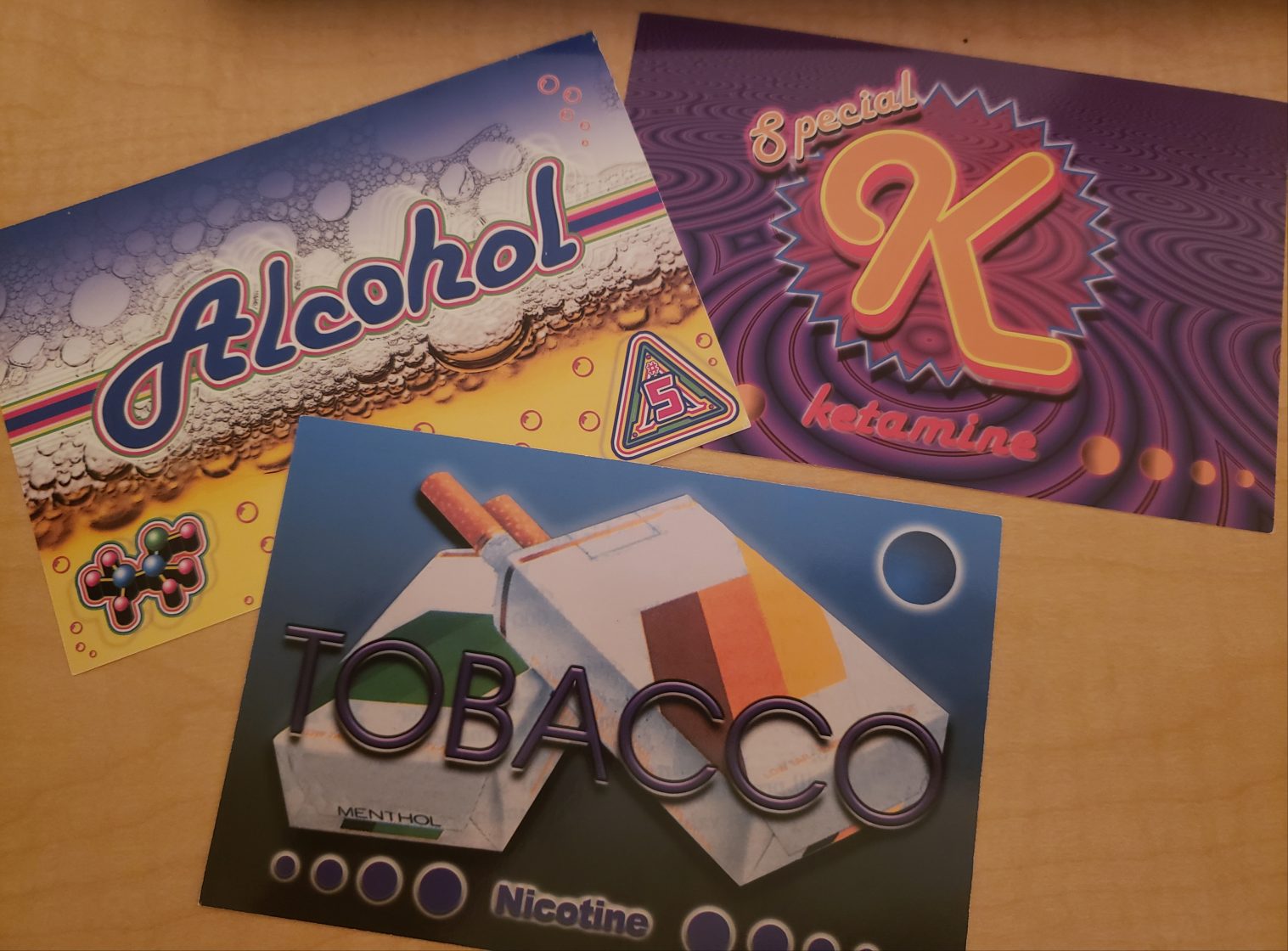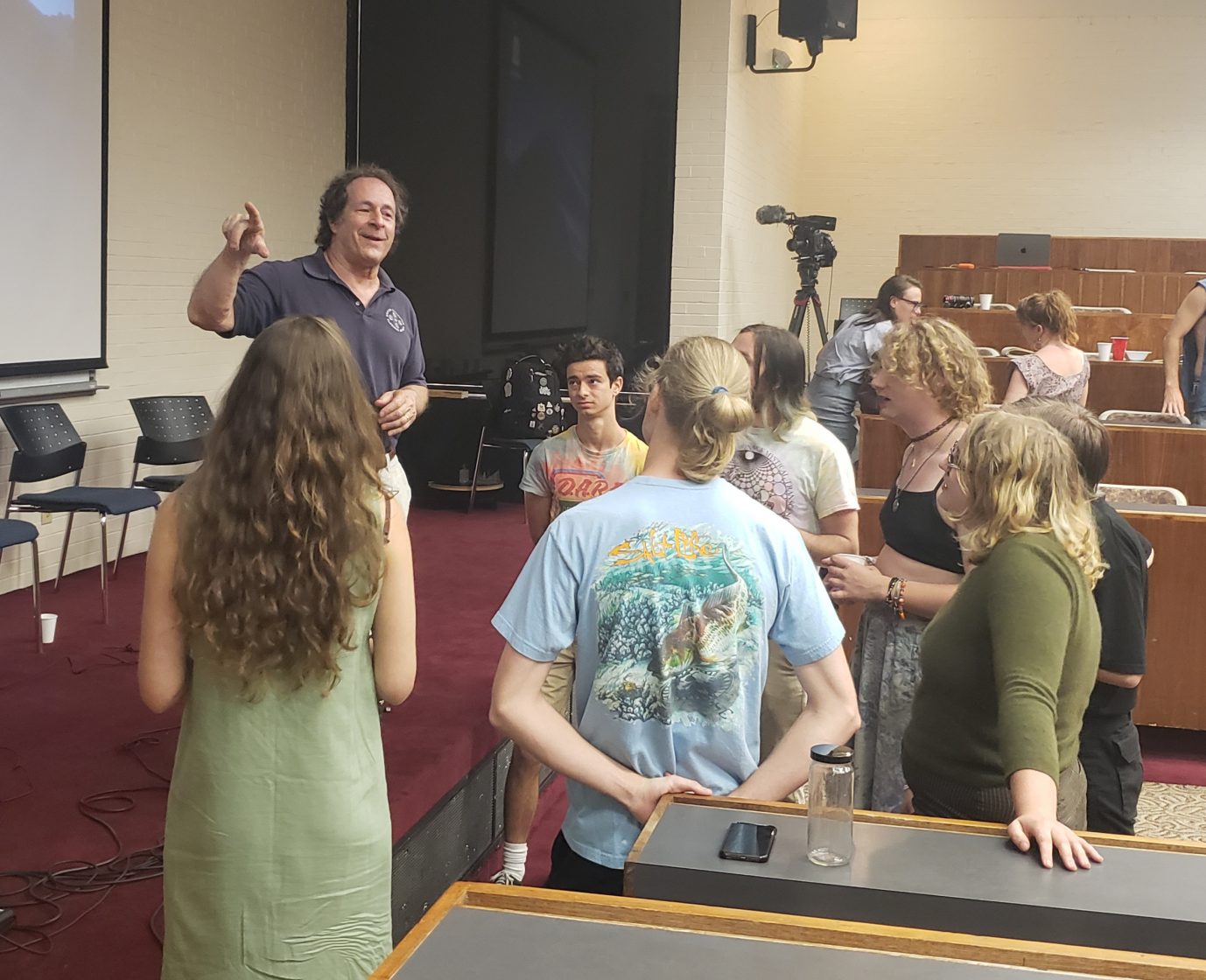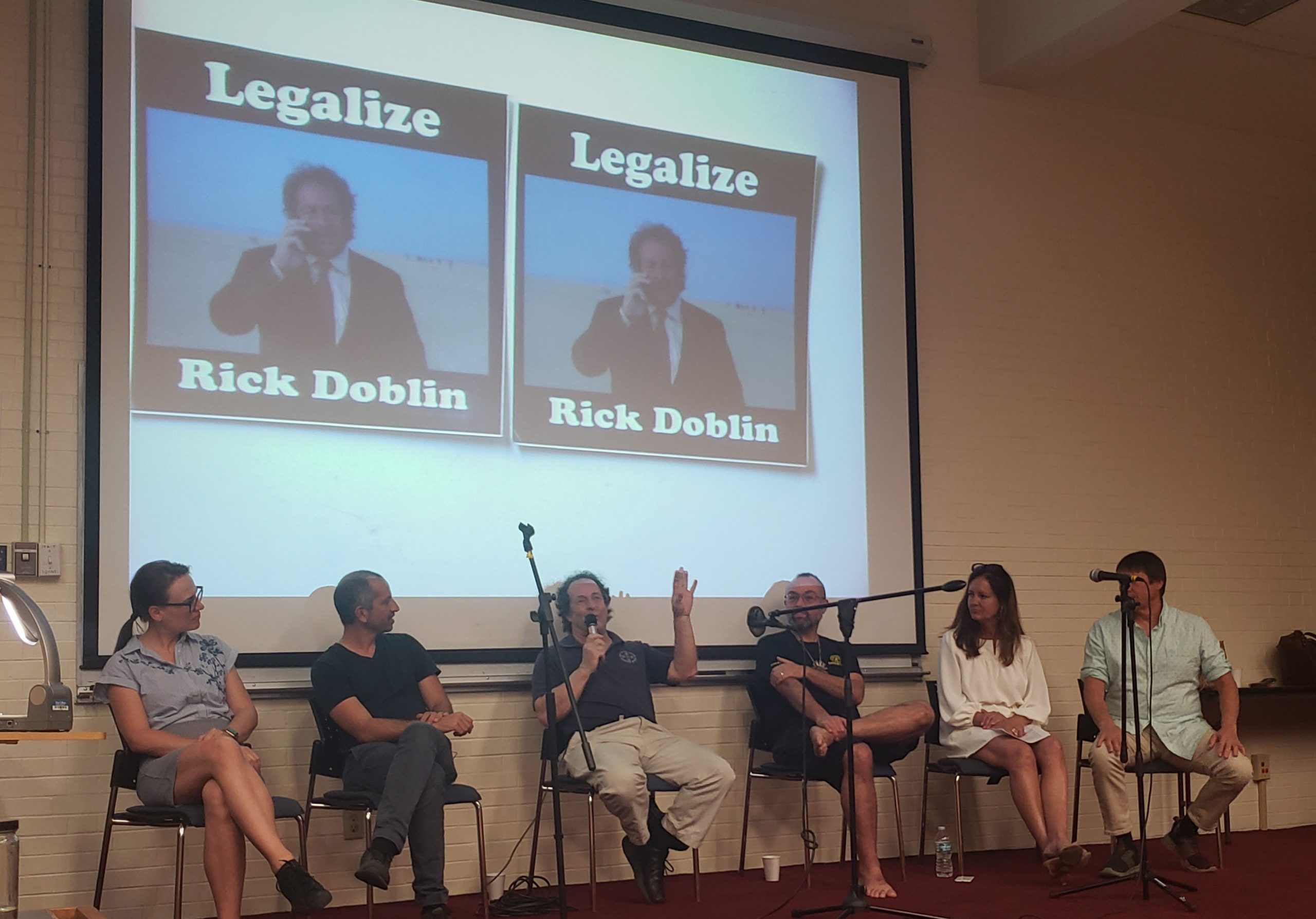As COVID-19 restrictions have begun to lift across the state and the early stages of the New College Challenge underway, there has been a resurgence of interest from students on campus in reconnecting with New College’s bizarre history and traditions, as both a “return to normal” appears to be eminent and as much of campus is on the threshold of change once again. One aspect of New College history that administration has been known to diminish is New College’s vibrant drug and party culture—although perhaps this is no surprise, so as to preserve the college’s reputation for prospective students and their families. Even so, it is a bit of an open secret that New College was a bit crazier “back in the day”…but what does that even mean? In a guest panel organized by Students for Sensible Drug Policy (SSDP) on Apr. 17 in HCL 8—and featuring several alum superstars in the world of psychedelic research and harm reduction—students new and old shared stories of New College lore, parties, protests and ongoing research and destigmatization of various substances.
Panelists included Founder and Chair of the Multidisciplinary Association for Psychedelic Studies (MAPS) Rick Doblin (‘87), Executive Director of DanceSafe and Harm Reduction Consultant for MAPS Mitchell Gomez (‘07), criminal defense lawyer and drug policy advocate Allen Hopper (‘88), filmmaker Nirvan Mullick (‘97), former Deputy Director of MAPS for 10 years Valerie Mojeiko and psychotherapist with a focus on sex and relationships Eva Dillon.
Doblin founded MAPS in 1986, originally to advocate for MDMA use—otherwise known as ecstasy—as therapeutic treatment. For the past 36 years, MAPS has been working to legalize MDMA and researching its treatment usages on autistic adults suffering from social anxiety and anxiety in adults with life-threatening illnesses. MAPS is currently in the planning stages to continue research on MDMA-assisted therapy for those with eating disorders, and is investigating MDMA-assisted therapy for those with post traumatic stress disorder (PTSD) as the second of two Phase 3 trials to support Food and Drug Administration (FDA) approval.
“In our first Phase 3 study, 88% of participants with severe PTSD experienced a clinically significant reduction in PTSD diagnostic scores two months after their third session of MDMA-assisted therapy, compared to 60% of placebo participants,” the MAPS website declares.
Doblin is practically a household name among New College students, and is often regarded as one of the college’s most influential alumni. He graduated with a Psychology Area of Concentration (AOC), but took several tutorials on psychedelics throughout his New College career. Doblin explained during the panel that he had originally wanted to major in Psychedelic Therapy, but that New College wouldn’t let him out of concern that other students would follow his lead.
Joining him on stage was Gomez, who graduated with a slash AOC in Anthropology and Environmental Studies. He described barely graduating high school during the panel—due to never turning in homework and an unwillingness to “jump through hoops”—but getting an Associate’s degree specifically so he could come to New College. Gomez recalled having an interest in psychedelics and alternate perceptions of reality as young as 10 or 11 years old, and joked about the failings of his ninth grade Drug Abuse Resistance Education (DARE), which inadvertently taught him that raves were the best place to obtain certain psychedelics.
“Realizing that they were drugs that could ultimately alter your perception of self and reality was really groundbreaking for me, because at 10 or 11 I assumed that my perception of reality was reality,” Gomez said. “I thought the thing I was experiencing was what was happening. The realization that that was not the case, that that could be altered, learning that that could be altered was really interesting.”

Now, as the Executive Director of DanceSafe, Mitchell works to distribute drug test kits and educational materials at raves, music events and other festivals. Perhaps DanceSafe’s biggest accomplishment is their sale and distribution of roughly 200,000 fentanyl test strips every three months.
“Fentanyl and its analogs are highly potent synthetic opioids that are many times stronger than heroin,” according to DanceSafe. “In North America alone, hundreds of thousands of people have died from unknowingly ingesting fentanyl-contaminated drugs. Accidental fentanyl overdose was the number one cause of death in people ages 18 – 45 in 2020.”
“As of the last 12 months, we have passed 70,000 fentanyl deaths alone,” Gomez elaborated. “Fentanyl alone is a larger one-year drug death total than the highest year of HIV deaths, the highest year of car accident deaths and the highest year of gun deaths. This is arguably the largest youth public health crisis in U.S. history.”
Hopper, like Gomez, also once worked with MAPS by serving on the Board of Directors. Notably, he was a member of the six-attorney drafting team for Proposition 64: The Adult Use of Marijuana Act in California, and has represented members of the Wo/Men’s Alliance for Medical Marijuana (WAAM). He graduated with a slash AOC in Political Science and Philosophy, and was also once the New College Student Alliance (NCSA) President.
Hopper explained that he had initially wanted to attend the University of South Florida (USF), but stumbled upon New College by virtue of visiting his brother who attended Ringling College of Art and Design. He described seeing a USF emblem on New College’s campus while driving by it one day, and went to inquire at the USF Sarasota Campus.
“I went to ask them about that at the USF admissions office, and they were like, ‘No, that’s something completely different. You’re not interested,’” Hopper said. “But I was like, ‘No, what is it?’ And they finally dug through this pile of dusty pamphlets and gave me a New College one.”
“I wanted to be a lawyer because I wanted to have the tools to be able to protect myself and my friends from cops,” Hopper continued. “The interactions we would have with the police [on campus] shaped me politically and oppositional to ‘the man.’”
And finally, while Mullick does not have the same experience in psychedelic research as the other panelists, he is directing and producing a documentary—Prescription X: A Rick Doblin Story, clips of which were shown at the panel. Mullick graduated with a slash AOC in Philosophy and Fine Arts, and also showed a screening of his experimental animated thesis film, Fish Eye Guy and Why the Trees Died, which revolves around transmitting New College history and lore: “It’s about this place, it’s about us. I don’t think anybody else would really understand it.”
”I felt that stories were the way that culture at New College is passed down and that culture could change, through strategic storytelling,” Mullick explained. “When I was a student, they would always say how ‘back in the day’ New College was so radical and crazy and now it’s conservative, and I was really curious if that was the case, if that’s still the case.”
The panel was organized by SSDP President and second-year Sophie Flem, who explained that it was several years in the making—and that it had been shut down by administration more than once in the past.
“I don’t know who exactly was shutting it down,” Flem continued. “But every time Hannah Hoogerwoerd (‘21), the former president, tried to run this event a few times a couple of years ago, I think someone in Housing or Student Affairs kept being like, ‘No, don’t do this.’”
“We’ve tried to have this discussion with New College in the past, and the administration has refused to let it happen, so it’s kind of astonishing that we’re here at all,” Doblin said during the panel, echoing Flem.
Flem went on to give a brief abridged history of psychedelics in America in an interview before the panel. They explained that psychedelic use is a practice dating back thousands of years, to the use of mushroom teas or peyote by indigenous groups throughout the world.
“And then of course, due to both colonialism and later the war on drugs, we’ve seen the loss of these practices, both in their original communities and in the countercultural movement,” Flem said. “To a point where we’ve had crackdowns on LSD labs, crackdowns on people growing mushrooms, on ketamine, MDMA—any of these things that either historically, thousands of years ago or in the past century, people have been using to treat mental conditions or for spiritual reasons as well.”
This lasting stigmatization of psychedelics and other drugs folds into New College history in a significant way. Flem explained that New College students have, historically, tended to be “much more willing to talk about drug usage,” and that the campus culture fostered an environment of open discussion and harm reduction.
“I think that harm reduction practices are what we’ve needed rather than a crackdown on drug users and kicking people out, for example, perfectly good students but who might have used drugs,” Flem said.
“The single most dangerous way people use drugs is alone,” Gomez added during the panel. “Opioid overdoses are not that dangerous if there’s a person there who knows how to resuscitate or has NARCAN.”
New College drug culture has, additionally, shifted over time as the nature of police and student relationships have changed, as Flem describes past campus police as “paid security guards who didn’t really care about people using drugs.”
“The campus police would tell us that it was their job to protect us from the real police,” Doblin said, reflecting on his own time as a student.
“I think that the past of New College, where we didn’t have the concerns about administrative backlash on drug use, police presence being ramped up on campus and scaring a lot of people out of admitting to this stuff or talking about this stuff in these public settings—I think that that has kind of changed the campus drug culture for the worse,” Flem concluded. “But I also think that as psychedelics become normalized through psychedelic research, it can become acceptable to talk about these things openly again.”

One thing that united both the alumni panelists and the current students in attendance was an overarching investment in New College history—both how things had once been, and how things are right now.
“I’m really lucky I got to go here at a time where you could be a psychedelic jackass and not end up in handcuffs,” Gomez said.
Hopper, similarly, spoke of privilege and how New College was once an “incredibly protected bubble.” He also reflected on how grateful he was for a strong sense of community at New College while undergoing his psychedelic journey, and encouraged current students to take advantage of the communal nature of the college.
”Enjoy it while you can, it will not always be this way,” Hopper said. “It will not always be so easy to have a group of friends who you can bond with like that and share those experiences with.”
Doblin also spoke on behalf of New College’s flexible academic program, which allowed for tutorials, Independent Study Projects (ISP) and an undergraduate thesis that shaped the rest of his academic and professional career.
“Later when I ended up at Harvard I realized that the freedom I had here at New College was essential to what I wanted to study and who I would become,” Doblin said.
Additionally, the panelists discussed ways in which Walls provide a special space for students in the conversation of New College lore.
“I think there’s been an active effort on the part of the administration to squash the party culture, squash the ways people can get together and meet new people, and I think it’s been intentional in some ways,” Doblin commented.
“I remember Walls being the place where I felt the stories of New College would be passed on,” Mullick said. “My film [Fish Eye Guy] was really looking at Palm Court, looking at the idea of individuality while also trying to figure out the collective, and how do you integrate your personal story with this bigger story that we’re all co-authoring. It’s our responsibility to tell the story that we want to see. We can’t just listen to these stories of people back in the day doing cool shit, we need to figure out our own cool shit to do.”
The panelists also gave students their two cents on the ongoing conversation of campus surveillance, following a series of on-campus intrusions over the course of the past two years. Gomez revealed that prior to Center of the Universe Parties (COUPs)—previously called Palm Court Parties (PCP)—becoming closed campus events, up to 6,000 people could be on campus for one. However, having people on campus who were unaffiliated with the college posed a significant risk, and Gomez recalled friends of his being assaulted during PCPs several years in a row.
“If security cameras are going to be used to keep an eye on things like that, of course I support it,” Gomez said. “But I think that the only way to do it safely is to make sure that nobody has access to those cameras until an incident transpires. This is your [the student body’s] privacy being impacted, this you are the ones that have to make the decisions about where that line is.”
The Psychedelic Research panel revealed several things about New College culture—that an emphasis on harm reduction, destigmatization and an open community lie at the heart of New College history. But it also showed that alumni are equally concerned about preserving this side of New College as current students are, and that they offer an essential perspective to the conversation.
“Every four years, the students leave and the administration stays,” Mullick said. “So how do you come up with a system that can pass along ideas to the next generation that’s coming?”


woohoo thanks sophia for this lovely article!! your research and writing skill is masterful!
p.s. if anyone would like fentanyl test strips, narcan, or drug information cards, go to the SHARE room in hamilton center or contact me at sophie.flem23@ncf.edu ^_^
Terrific article! After the talk, some of us alums gathered with students at the Bay for sunset. We discussed the possibility of an ISP on drug policy and harm reduction at New College that Mitchell Gomez and I could help with if faculty support could be found. Mitchel and I each offered to donate $125 ($250 total) for food for breakfast in Palm Court after graduation PCP. We were appalled that parties are supposed to end at 3 AM, intentionally creating more risk than if parties went until sunset.